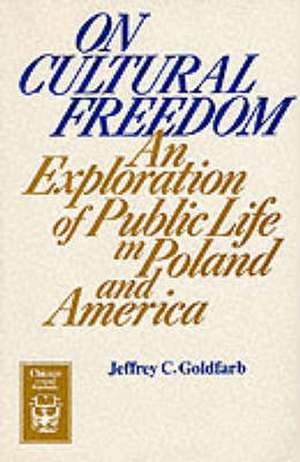On Cultural Freedom: An Exploration of Public Life in Poland and America
Autor Jeffrey C. Goldfarben Limba Engleză Paperback – 31 dec 1982
In this timely study, Jeffrey C. Goldfarb explores the nature and prospects of cultural freedom by examining the conditions that favor or threaten its development in the political East and West.
Goldfarb—who examines conditions in the Soviet Union, the United States, and their respective European allies—focuses most closely upon Poland and the United States. He investigates a wide range of concrete cases, including the Polish opposition movement and Solidarity, the migration of artists, the American television and magazine industries, American philanthropy, and communist cultural conveyor belts.
From these cases, Goldfarb derives a definitive set of sociological conditions for cultural freedom: critical creativity which resists systematic constraints, continuity of cultural tradition, and a relatively autonomous public realm for the reception of culture. Cultural freedom, Goldfarb shows, is not a static state but a process of achievement. Its parameters and content are determined by social practice in cultural institutions and by their relations with other components and the totality of social structure.
So defined, cultural freedom is transformed from an ideological concept into one with real critical and analytical power. Through it we can appreciate the invisible nature of constraint in the West and the unapparent but acting supports of cultural freedom existing in socialist countries. Most importantly, Goldfarb's conclusions provide a framework for understanding more clearly than before the circumstance of cultural freedom in both East and West so that citizens may utilize their full creative abilities as they address the problems of the present day.
Goldfarb—who examines conditions in the Soviet Union, the United States, and their respective European allies—focuses most closely upon Poland and the United States. He investigates a wide range of concrete cases, including the Polish opposition movement and Solidarity, the migration of artists, the American television and magazine industries, American philanthropy, and communist cultural conveyor belts.
From these cases, Goldfarb derives a definitive set of sociological conditions for cultural freedom: critical creativity which resists systematic constraints, continuity of cultural tradition, and a relatively autonomous public realm for the reception of culture. Cultural freedom, Goldfarb shows, is not a static state but a process of achievement. Its parameters and content are determined by social practice in cultural institutions and by their relations with other components and the totality of social structure.
So defined, cultural freedom is transformed from an ideological concept into one with real critical and analytical power. Through it we can appreciate the invisible nature of constraint in the West and the unapparent but acting supports of cultural freedom existing in socialist countries. Most importantly, Goldfarb's conclusions provide a framework for understanding more clearly than before the circumstance of cultural freedom in both East and West so that citizens may utilize their full creative abilities as they address the problems of the present day.
Preț: 191.24 lei
Preț vechi: 228.43 lei
-16% Nou
Puncte Express: 287
Preț estimativ în valută:
36.63€ • 37.74$ • 30.68£
36.63€ • 37.74$ • 30.68£
Carte indisponibilă temporar
Doresc să fiu notificat când acest titlu va fi disponibil:
Se trimite...
Preluare comenzi: 021 569.72.76
Specificații
ISBN-13: 9780226301006
ISBN-10: 0226301001
Pagini: 184
Dimensiuni: 146 x 229 x 10 mm
Greutate: 0.22 kg
Editura: University of Chicago Press
Colecția University of Chicago Press
ISBN-10: 0226301001
Pagini: 184
Dimensiuni: 146 x 229 x 10 mm
Greutate: 0.22 kg
Editura: University of Chicago Press
Colecția University of Chicago Press
Notă biografică
Jeffrey C. Goldfarb, associate professor in the Department of Sociology at the New School for Social Research, is the author of The Persistence of Freedom: the Sociological Implications of Polish Student Theater.
Cuprins
Preface
Introduction
1. On Understanding between Political East and West: Reflections on the Polish Opposition
2. Cultural Freedom: From East to West
3. The Structure of Cultural Freedom in Mass Society
4. Comparative Class Structure, Systems of Domination, and Cultural Freedom
5. Cultural Freedom and Political Control in Poland
6. Cultural Freedom and Economic Control in America
7. Bureaucracy and Cultural Freedom
8. Conclusion
Notes
Index
Introduction
1. On Understanding between Political East and West: Reflections on the Polish Opposition
2. Cultural Freedom: From East to West
3. The Structure of Cultural Freedom in Mass Society
4. Comparative Class Structure, Systems of Domination, and Cultural Freedom
5. Cultural Freedom and Political Control in Poland
6. Cultural Freedom and Economic Control in America
7. Bureaucracy and Cultural Freedom
8. Conclusion
Notes
Index
